BMW 7 Series VS Toyota Proace Bus
BMW 7 Series
The BMW 7 Series represents the pinnacle of luxury and performance in the executive car segment, offering an unparalleled driving experience. Its elegant design combines aesthetic appeal with advanced technology, ensuring both comfort and connectivity for its passengers. With cutting-edge driver assistance systems, this flagship model showcases the brand's commitment to innovation and safety.
more informationToyota Proace Bus
The Toyota Proace Bus offers a versatile and practical solution for those in need of spacious passenger transport combined with a touch of comfort. Its interior is designed to maximise seating capacity while ensuring that both driver and passengers can enjoy a pleasant journey. With its efficient engine options and reliable build quality, this vehicle remains a popular choice for families and businesses alike.
more information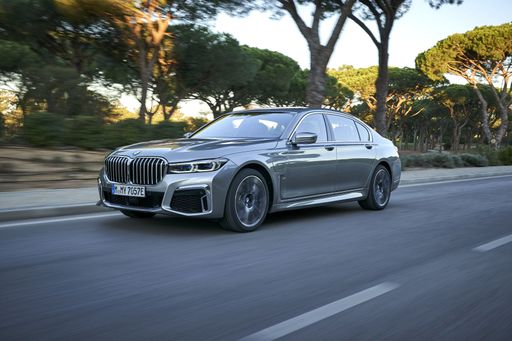 @ press.bmwgroup.com
@ press.bmwgroup.com
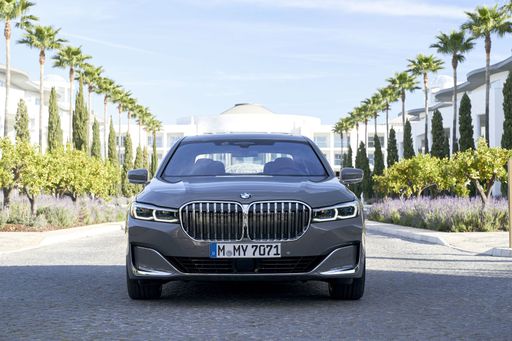 @ press.bmwgroup.com
@ press.bmwgroup.com
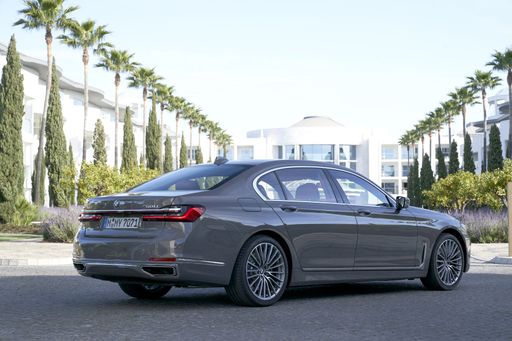 @ press.bmwgroup.com
@ press.bmwgroup.com
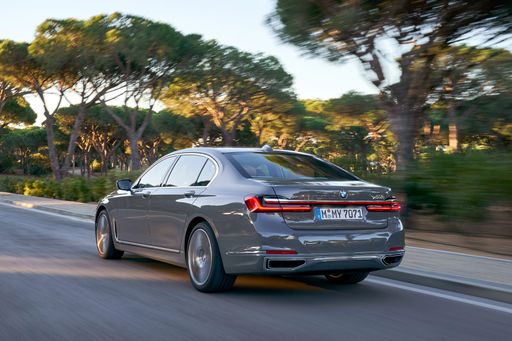 @ press.bmwgroup.com
@ press.bmwgroup.com
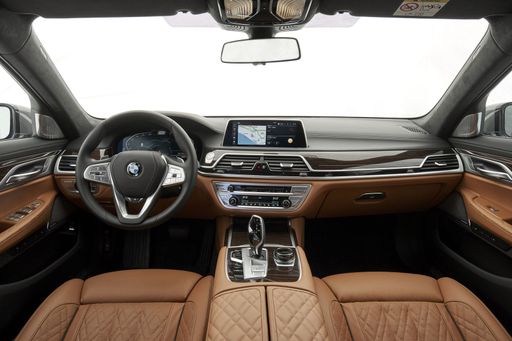 @ press.bmwgroup.com
@ press.bmwgroup.com
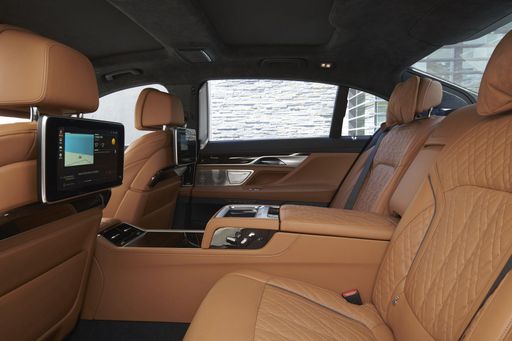 @ press.bmwgroup.com
@ press.bmwgroup.com
Costs and Consumption |
|
|---|---|
|
Price
about 100300 - 127000
£
|
Price
about 38500 - 51000
£
|
|
Consumption L/100km
1.1 - 6.2
L
|
Consumption L/100km
7.3 - 7.4
L
|
|
Consumption kWh/100km
-
|
Consumption kWh/100km
24.2
kWh
|
|
Electric Range
77 - 79
km
|
Electric Range
218
km
|
|
Battery Capacity
18.7
kWh
|
Battery Capacity
-
|
|
co2
24 - 162
g/km
|
co2
0, 193, 191
g/km
|
|
Fuel tank capacity
65 - 74
L
|
Fuel tank capacity
69
L
|
Dimensions and Body |
|
|
Body Type
Sedan
|
Body Type
Bus
|
|
Seats
5
|
Seats
8 - 9
|
|
Doors
4
|
Doors
4 - 5
|
|
Curb weight
2255 - 2525
kg
|
Curb weight
1835 - 1949
kg
|
|
Trunk capacity
525 - 540
L
|
Trunk capacity
0
L
|
|
Length
5391
mm
|
Length
4983 - 5333
mm
|
|
Width
1950
mm
|
Width
1920
mm
|
|
Height
1544
mm
|
Height
1890
mm
|
|
Payload
605 - 665
kg
|
Payload
879 - 975
kg
|
Engine and Performance |
|
|
Engine Type
Diesel MHEV, Plugin Hybrid
|
Engine Type
Electric, Diesel
|
|
Transmission
Automatic
|
Transmission
Automatic, Manuel
|
|
Transmission Detail
Automatic Gearbox
|
Transmission Detail
Reduction Gearbox, Manual Gearbox, Automatic Gearbox
|
|
Drive Type
All-Wheel Drive
|
Drive Type
Front-Wheel Drive
|
|
Power HP
300 - 571
HP
|
Power HP
136 - 177
HP
|
|
Acceleration 0-100km/h
4.3 - 5.8
s
|
Acceleration 0-100km/h
13.3
s
|
|
Max Speed
250
km/h
|
Max Speed
130 - 170
km/h
|
|
Torque
670 - 800
Nm
|
Torque
260 - 400
Nm
|
|
Number of Cylinders
6
|
Number of Cylinders
4
|
|
Power kW
220 - 420
kW
|
Power kW
100 - 130
kW
|
|
Engine capacity
2993 - 2998
cm3
|
Engine capacity
1997
cm3
|
|
Top speed
250
km/h
|
Top speed
130 - 170
km/h
|
General |
|
|
Model Year
2023
|
Model Year
2024
|
|
CO2 Efficiency Class
F, B
|
CO2 Efficiency Class
A, G
|
|
Brand
BMW
|
Brand
Toyota
|
BMW 7 Series
Introduction to the BMW 7 Series
The BMW 7 Series has long been synonymous with luxury, performance, and cutting-edge technology. The latest versions continue this tradition, integrating sophisticated hybrid technology with distinguished design and powerful performance. Whether cruising the motorway or navigating urban landscapes, the BMW 7 Series offers an exceptional driving experience.
Technical Specifications
The 2023 BMW 7 Series boasts a range of impressive specifications and features. The engine options, which include both diesel mild-hybrid and plug-in hybrid variants, provide flexibility for different driving needs. With power outputs ranging from 300 PS to a remarkable 571 PS, the 7 Series does not compromise on performance. Coupled with intelligent all-wheel drive and an automatic transmission, it assures smooth and responsive handling.
Fuel efficiency is another highlight, with the series achieving consumption figures as low as 1.1 L/100km for the plug-in hybrid models, showcasing the brand's commitment to sustainability without sacrificing performance.
Advanced Hybrid Technology
The integration of mild-hybrid and plug-in hybrid systems into the 7 Series marks a significant advancement in BMW's pursuit of greener motoring. The plug-in hybrid variants, with a battery capacity of 18.7 kWh, offer an all-electric range of up to 79 km - ideal for city driving. This hybrid setup not only reduces emissions but also enhances acceleration, delivering a swift 0-100 km/h time ranging from 4.3 to 5.8 seconds.
Luxury and Comfort
The BMW 7 Series epitomises luxury, featuring an interior designed for comfort and convenience. Standard equipment includes high-grade materials, advanced connectivity, and cutting-edge infotainment systems. The cabin is spacious, with ample room for five passengers and a generous boot capacity of up to 540 litres, ensuring that long journeys are as comfortable as they are efficient.
Safety and Innovation
Safety remains paramount in the BMW 7 Series, with an array of features designed to protect occupants and enhance driving confidence. This includes state-of-the-art driver assistance systems, which provide support in various driving conditions, thus ensuring a safer driving experience.
In conclusion, the BMW 7 Series stands as a testament to automotive innovation, blending traditional luxury with modern efficiency and performance. It's a fine choice for those who seek the pinnacle of automotive engineering and technology.
Toyota Proace Bus
The Versatile Companion: Toyota Proace Bus
The Toyota Proace Bus stands out in the competitive MPV segment, offering a blend of practicality, efficiency, and innovative technology. Toyota has crafted this vehicle to cater to a wide array of needs, whether it be family outings, business transport, or electric motoring. Let's delve into the technical details and innovations that make the Toyota Proace Bus a compelling choice.
Engineering Excellence: Diesel and Electric Variants
The Proace Bus provides several powertrain options to meet diverse requirements. Customers can choose between robust diesel engines or an innovative electric drive system. Diesel variants feature a 2.0 D-4D engine available in various outputs, from 144 PS to 177 PS, supporting both manual and automatic gear options. The diesel engines deliver a balanced performance, with fuel consumption ranging between 7.3 to 7.4 L/100km.
On the electric front, the Proace Electric offers an enticing prospect for eco-conscious drivers. Equipped with a battery capacity of up to 75 kWh, this variant ensures a respectable range of up to 343 km on a single charge, while consuming between 24.2 to 24.4 kWh/100 km. The electric model delivers 136 PS, making it ideal for smooth urban driving.
Interior Innovation: Comfort Meets Functionality
The Toyota Proace Bus impresses with its versatile interior, accommodating 5 to 9 passengers comfortably. Various seating configurations are available depending on the version and needs, making it a perfect solution for both large families and shuttle services. Modern technology adorns the cabin, with a focus on comfort and connectivity, ensuring all passengers travel in style and enjoy seamless connectivity options.
Safety Features and Driver Assistance Technologies
Safety is paramount in the Proace Bus, featuring a plethora of driver assistance systems designed to protect both passengers and pedestrians. Advanced features include parking assistance, lane departure warning, and adaptive cruise control, providing peace of mind during long journeys.
Efficiency and Environmental Considerations
Balancing performance with environmental responsibility, the Proace Bus range includes models that meet various CO2 efficiency classes from A to G. The electric variant notably achieves zero CO2 emissions, making it an excellent choice for sustainable mobility. Furthermore, innovations in aerodynamics and weight management contribute to the Proace Bus's commendable efficiency metrics.
Conclusion: A Dynamic Choice for Modern Needs
The Toyota Proace Bus exemplifies Toyota's commitment to versatility, efficiency, and innovation. With its broad range of engine options, seating configurations, and state-of-the-art technologies, it serves multiple purposes while keeping operational costs in check. Whether for family, business, or eco-friendly motoring, the Proace Bus is a formidable contender in today's automotive landscape.
